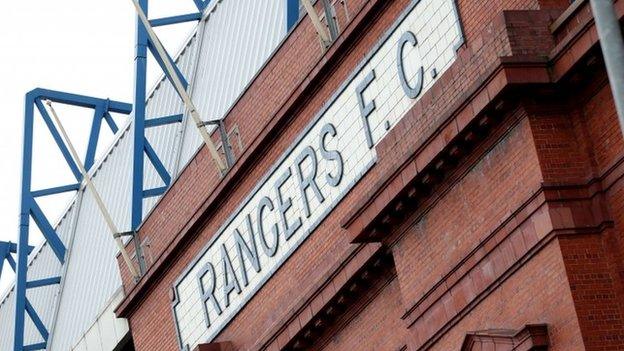Rangers: HMRC loses appeal over ruling in Big Tax Case
- Published

A verdict delivered by the first-tier tribunal in November 2012 favoured, in principle, the position of the Murray Group, which formerly owned Rangers
HM Revenue and Customs has lost its appeal over Rangers' use of Employee Benefit Trusts (EBTs) - the so-called "Big Tax Case".
Upper tier tribunal judge Lord Doherty dismissed the appeal against a first-tier tax tribunal decision, external but referred several issues back to the panel.
The tax authority had argued that payments made to players and other employees should be taxable.
The Murray Group, which formerly owned Rangers, argued they were loans.
The first-tier tribunal (FTT) had issued a 2-1 majority verdict in November 2012 which favoured, in principle, the Murray Group and ordered that HMRC's £46.2m demands, about three-quarters of which referred to the liquidated club, be "reduced substantially".
The upper-tier appeal has largely upheld that verdict but some payments will be re-examined by the original tribunal, including termination and "guaranteed bonus" payments.
However, the Murray Group appeared to secure an additional victory relating to payments made to several people including former Ibrox chairman Sir David Murray, which it argued were not special cases.
The judgement, which has no impact on the current Rangers owners, reads: "The appeal is dismissed except in so far as it relates to the termination payments.
"I shall remit the case to the FTT with a direction to allow the taxpayers' appeals against the assessments relating to the payments to the sub-trusts of Sir David Murray, his sons, Mr McClelland and Mr MacMillan; to proceed as accords in relation to the termination payments, the payments in respect of guaranteed bonuses, and any related questions of grossing up.
"Standing my findings and my disposal, the remit should be to the FTT as originally constituted."
It is unclear how many termination payments were made but the FTT's decision referred to five "guaranteed bonus" payments.
In a statement, a spokesman for Murray International Holdings (MIH) expressed satisfaction with the ruling but said there were no winners.
He said: "We are pleased with the judgement which again leaves negligible tax liability and overwhelmingly supports the views collectively and consistently held by our advisers, legal counsel and MIH itself.
"We will therefore review the detailed content of the decision with our legal counsel and advisers to ascertain what action, if any, is now required by MIH.
"The decision substantially reduces HMRC's claim in the liquidation of the old Rangers Football Club.
'Expensive process'
"While we have been successful in both the FTT and UTT, there are, as we have stated previously, no victors.
"This has been an exceptionally long, difficult and expensive process involving not just the FTT and UTT but also several approaches to resolve the with senior HMRC officials on a commercially sensible basis for all parties which were rejected."
The spokesman said MIH had, at all times, recognised that the tax tribunal proceedings stemmed from arrangements put in place during its ownership.
They were introduced before legislative changes removed the tax efficiency of such arrangements from the end of 2010, he added.
But he said: "However, it is obvious that the much publicised existence of these proceedings overshadowed Rangers Football Club for many years and tarnished the external perception of its value.
"There can be little doubt that despite favourable legal opinion, potential acquirers were therefore dissuaded from pursuing their interest during a period in which we were marketing the sale of MIH's shareholding.
"The case has also stimulated extensive press and social media comment, discussion and speculation, a significant quantity of which has been ill informed."
The spokesman said it would have been "entirely inappropriate" for MIH to have highlighted "fundamental misunderstandings or contribute to this public debate" during the legal proceedings.
He added: "Notwithstanding all of this, it is abundantly clear that Rangers Football Club would not have gone into administration or liquidation had the purchaser fulfilled its contractual obligations and responsibilities.
"Similar to the resolution of the UTT appeal, we hope that the relevant authorities conclude their investigations and commence proceedings at the earliest opportunity."
A spokesman for HMRC said: "We are naturally disappointed with today's decision and are considering an appeal."
HMRC has one month to decide whether or not to seek permission to lodge an appeal with the Inner House of the Court of Session.
Rangers began using the EBT scheme while under the control of Sir David Murray.
He sold the club for £1 to Scottish businessman Craig Whyte in 2011, while the tax liability was in dispute.
Rangers were subsequently forced into administration by HMRC in February 2012, over non-payment of tax totalling about £14m, while under Mr Whyte's control.
HMRC subsequently rejected proposals for a creditors agreement that would have prevented Rangers from going into liquidation.
Rangers released a statement in response to the decision on their website.
It said: "Rangers Football Club Limited (the "Club") notes the findings of Lord Doherty in the HMRC case against Rangers Football Club plc (Oldco) and shares the views of many fans that so much of what later ensued at our club following the start of that investigation was avoidable.
"We are pleased to see the end of this sorry chapter in the history of Rangers FC, yet our greatest sympathy is with those who felt the pain of the last four years the most - our supporters.
"In spite of almost unrelenting attacks and setbacks they have never flinched from supporting their football club with all their energy and resolve.
"It is a matter for the authorities to explain their actions during this entire period that has seen the good name of Rangers severely damaged.
"Our focus is on rebuilding the football club and getting Rangers back to where we belong. That, in itself, will help right some of the wrongs our club and supporters have suffered over the last four years."